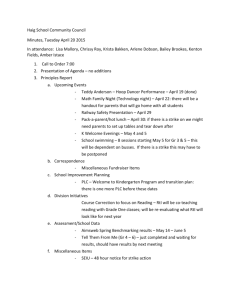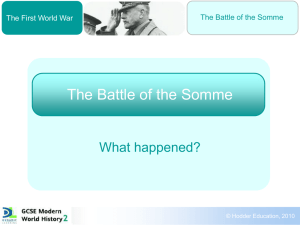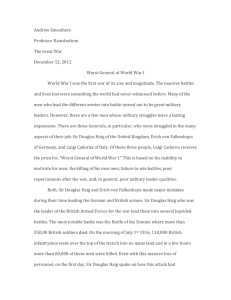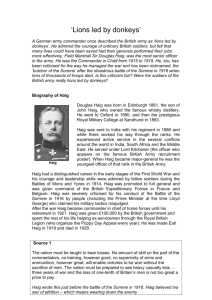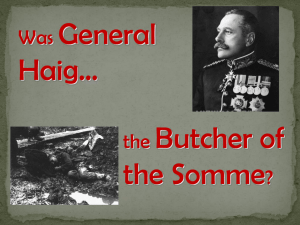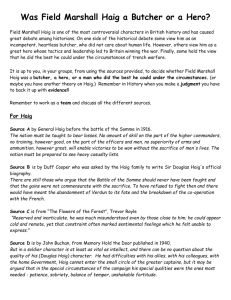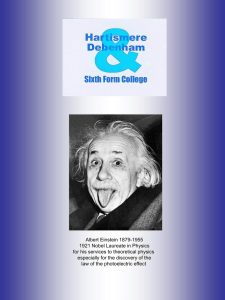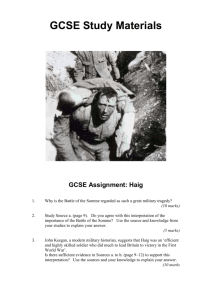Project Document - Charnwood Great War Project
advertisement
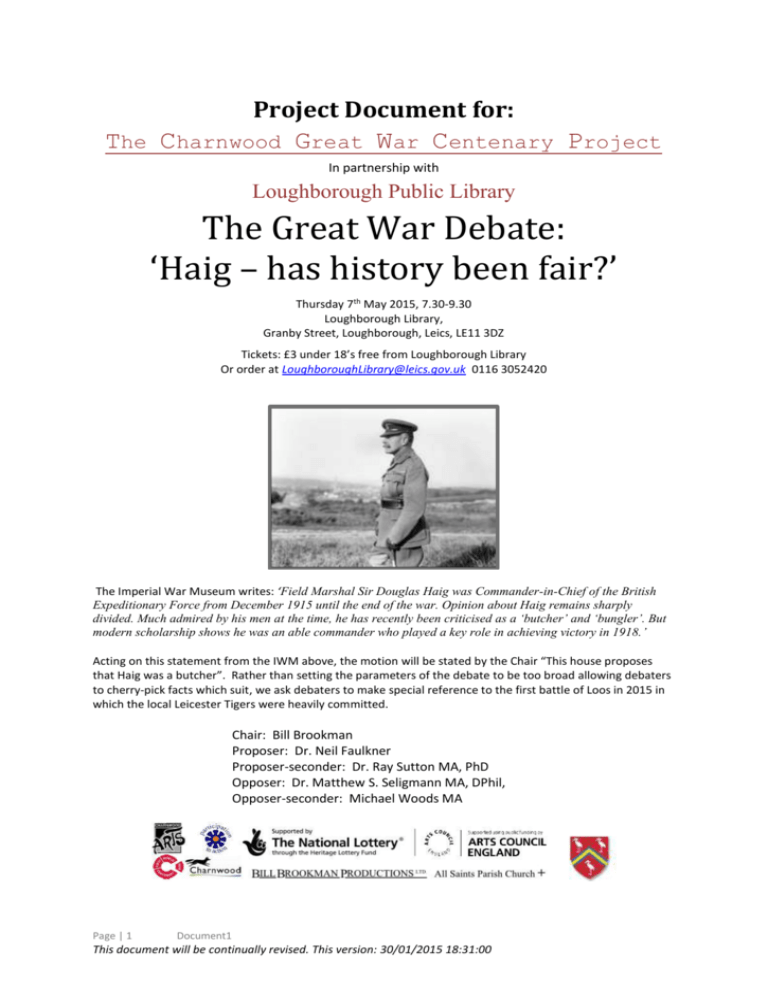
Project Document for: The Charnwood Great War Centenary Project In partnership with Loughborough Public Library The Great War Debate: ‘Haig – has history been fair?’ Thursday 7th May 2015, 7.30-9.30 Loughborough Library, Granby Street, Loughborough, Leics, LE11 3DZ Tickets: £3 under 18’s free from Loughborough Library Or order at LoughboroughLibrary@leics.gov.uk 0116 3052420 The Imperial War Museum writes: ‘Field Marshal Sir Douglas Haig was Commander-in-Chief of the British Expeditionary Force from December 1915 until the end of the war. Opinion about Haig remains sharply divided. Much admired by his men at the time, he has recently been criticised as a ‘butcher’ and ‘bungler’. But modern scholarship shows he was an able commander who played a key role in achieving victory in 1918.’ Acting on this statement from the IWM above, the motion will be stated by the Chair “This house proposes that Haig was a butcher”. Rather than setting the parameters of the debate to be too broad allowing debaters to cherry-pick facts which suit, we ask debaters to make special reference to the first battle of Loos in 2015 in which the local Leicester Tigers were heavily committed. Chair: Bill Brookman Proposer: Dr. Neil Faulkner Proposer-seconder: Dr. Ray Sutton MA, PhD Opposer: Dr. Matthew S. Seligmann MA, DPhil, Opposer-seconder: Michael Woods MA Page | 1 Document1 This document will be continually revised. This version: 30/01/2015 18:31:00 The proposed argument for The Motion: Dr. Neil Faulkner’s argument would centre on Historian Alan Clarke’s view of lions led by donkeys. The point Faulkner would make would be that, in his opinion, it all boils down to one fundamental tenet: He does not care if Haig was a competent or incompetent general. It is irrelevant. What is relevant is that he was part of the ruling class and the rich who, as a minority, led the majority into war and death on a gargantuan scale in which they had no interest. If pushed about as to the merits or other of Haig he would state that the class structure of Haig and his circle meant that Haig did not trust his own men to use initiative and thus did not allow them to use judgements on the spot, resulting in massive and absurd tactical and strategic folly. But this, he again would emphasise, would be irrelevant to his main argument of the minority leading the majority into catastrophe. Dr. Ray Sutton has been asked to put the case for the proposition with particular regard to the strategy, and more especially the tactics of the Battle of Loos. The proposed argument for the opposition: For the opposition Prof. Seligmann is asked first to briefly address the common allegations of butcher, bungler, cavalry/myopia, contempt for human life, dispassion with regard to those killed and ‘shot at dawn’ etc.. He should briefly respond to those concerns which will certainly be on the minds of the ‘floor’. He would then flesh out a bigger picture about modern warfare in general. Michael Woods of the Western Front Association would respond more spontaneously to Dr. Ray Sutton’s allegations with regard to military strategy and tactics with particular reference to the Battle of Loos. He would make the case in an operational learning curve style argument. Debate Overview (see Appendix for details): Pre-event timings: 5.30 Bill Brookman and Madeleine Coburn arrive 6.00 – 6.30 Rehearse with Tommy Atkins and High School girls (note at present they may not be there because of exams – TBC) Doors open about 7.05. Tea and Coffee on sale by museum staff 7.30 – 7.45 Chair, Bill Brookman, introduces the Debate and the speakers. A vote is taken from the floor. Members of Tommy Atkins band perform a selection from Oh What a Lovely War! Short silence. Debate rules are introduced (see Appendix). 7.45 – 9.00 Proposer, opposer, proposer’s seconder and opposer’s seconder are invited to speak for 10 minutes. 9.00 – 9.15 Questions from the floor 9.15 – 9.30 3 minutes each: Opposer’s refutation and summation; Proposer’s refutation and summation. Final vote. Closing by the chair. Debate ends. 9.30 – 9.50 Tea coffee and clear up. 10.00 Event ends The Debaters Chair: Bill Brookman Director of The Bill Brookman Foundation, implementing partner to United Nations missions in Kosovo, Nepal, Uganda, Haiti and Somalia; actor musician and theatre director. Proposer: Dr. Neil Faulkner Historian, author of A Marxist History of the World and member of No Glory, Remembering the Real War, organisation representing ideas about the WW1 commemoration. Page | 2 Editor: Military History Monthly Contributor: Current Archaeology and Current World Archaeology Document1 This document will be continually revised. This version: 30/01/2015 18:31:00 Founder-director: Sedgeford Historical and Archaeological Research Project Co-director: Great Arab Revolt Project Research Fellow: Department of Archaeology and Anthropology, University of Bristol Fellow: Society of Antiquaries Author: The Decline and Fall of Roman Britain (2000, 2001, 2004) Apocalypse: the great Jewish revolt against Rome (2002, 2004, 2011) Hidden Treasure: digging up Britain’s past (2003) In Search of the Zeppelin War: the archaeology of the First Blitz (2008) Rome: empire of the eagles (2008, 2010) A Visitor’s Guide to the Ancient Olympics (2012) A Marxist History of the World: from Neanderthals to Neoliberals (2013) Digging Sedgeford: a people’s archaeology (forthcoming in 2014) Lawrence of Arabia’s War (forthcoming in 2015) Lecturer: NADFAS (National Association of Decorative and Fine Arts Societies) Tour Leader: Italy, Greece, Jordan, Tunisia, Libya, Turkey, and elsewhere TV archaeologist and historian: BBC2’s Timewatch, Channel 4’s Time Team, Channel 5’s Revealed, Sky Atlantic’s The British, and many others Proposer-seconder: Dr. Ray Sutton MA, PhD Local historian Ray Sutton has earned great respect for his erudition and research into a host of local, national and international issues. His well-attended and regular lectures have covered such wide topics as: Lost villages and castle sites of Leicestershire, Leicestershire Luddites and Chartists, and George Orwell and the Spanish Civil War. Opposer: Dr. Matthew S. Seligmann MA, DPhil, FRHistS Reader in History, Brunel University London, Department of Politics, History & the Brunel Law School Recent Publications include: The Royal Navy and the German Threat 1901-1914 Spies in Uniform: British Military and Naval Intelligence on the Eve of the First World War He writes: “I spent my first eighteen years living and working in London before deciding to follow my passion and study history. I was an undergraduate at the universities of Edinburgh and Pennsylvania, before completing a doctorate at Sussex under the supervision of Professor John Röhl, the world’s foremost authority on Kaiser Wilhelm II. Since then, I have worked mostly on Anglo-German relations and the causes of wars and have authored or co-authored nine books and numerous articles on these topics. I joined Brunel as Reader in History in September 2012 after many years of lecturing at the University of Northampton.” Opposer-Seconder: Michael Woods MA Michael Woods is an expert on strategy and tactic of the British army in WW1. He has submitted the dissertation The Forgotten Battle of Loos as part of the requirements for the degree of MA in British First World War Studies. He is assisted by Val Jaques and David Humberstone from The Leicestershire and Rutland Western Front Association, of which he is also a member. About the Charnwood Great War Centenary Project Funded by the National Lottery Fund, The Charnwood Great War Centenary Project exists to promote a greater understanding of the First World War through a series of initiatives and events including the repositioning of war memorials at Loughborough All Saints Parish Church; researching names on local monuments; heritage projects and events; schools projects and a series of conferences of which this debate forms a major part. About the CGWCP Conference Programme Activities in this series include: The Great War Centenary Debate ‘Haig – has history been fair?’ Youth Forum ‘WarGames/PeaceGames’ exploring articulacy reflecting to peace initiatives in the modern world. Date and place TBA Page | 3 Document1 This document will be continually revised. This version: 30/01/2015 18:31:00 Schools Conference: ‘Could WW1 have been different?. Hosted by Loughborough Grammar School, 13th November 2015. It will engage young people who already ideally have some grasp of history and politics by addressing three contentious questions: o Did Britain have to enter World War I? o Haig: Has history been fair? o Was the Treaty of Versailles a failure? Proposed partnership with Loughborough University in a major international conference addressing the ethics of technology in war. Possible date January 2016 Further Information Loughborough Library will host the conference and organise tickets and refreshments. Charnwood Arts will help publicise and document. Permission to photograph and video for educational and non-profit purposes will be assumed to be given unless stated otherwise. CGWCP will publicise it at: http://charnwoodgreatwar.billbrookman.co.uk/Centenary%20Debate.html https://www.facebook.com/WorldWar1Charnwood https://www.flickr.com/photos/bill_brookman/sets/72157639827669884/ http://www.charnwoodarts.com/events/2014/09 Debaters will be invited by Bill Brookman of the Charnwood Great War Centenary Project Local adult enthusiasts will be welcome to observe some of the proceedings The press will be invited; photography and film will be permitted unless requested to be specifically restricted. The results will be documented and put on line and in social media by Charnwood Arts Heritage Lottery Funding will be acknowledged Useful Contacts For Loughborough Public Library Carol Neath, Head Loughborough Public Library, Carol.Neath@leics.gov.uk Bharti Acharyia, Outreach Worker 0116 3058750 Bharti.Acharya@leics.gov.uk For The Charnwood Great War Centenary Project: Bill Brookman, conference organiser bill@billbrookman.co.uk 01509 236175, 07792 655 670 Kevin Ryan, CEO Charnwood Arts, lead partner Janet Grant, local history Madeline Coburn, Participation in Action, heritage http://charnwoodgreatwar.billbrookman.co.uk/Centenary%20Debate.html Appendix The Debate in Detail 1. 2. 3. Chair opens the debate and states the ‘real’ debating question: ‘Was Haig a Butcher?’ Pre-debate: Audience votes for, against and don’t know. Loughborough High School girls and members of Tommy Atkins Band perform selection from Oh What a Lovely War! (Script in Appendix) 4. Short silence to remember the dead 5. Chair explains the rules of the debate: 6. Using the Oxford Union model: Proposer, Opposer, Proposer-seconder, Opposer- seconder 7. All have 10 minutes, bell sounded after 12 minutes. 8. 15/20 min Q & A 9. Summation Opposer, 3 min. 10. Summation Proposer, 3 min. 11. Vote: For, against, undecided. 12. RULES: Chair will refer to the speakers with their titles as a sign of respect for their expertise in their subject but the public should judge them on the quality of their arguments, not their qualifications. Page | 4 Document1 This document will be continually revised. This version: 30/01/2015 18:31:00 13. A speaker can be interrupted by another speaker or from the ‘floor’ only on a ‘point of information’. And then, only by standing silently with their hand raised. The speaker may or may not accept the interruption at his/her own discretion. 14. Chair invited Neil Faulkner to propose the motion ‘This House believes that Haig was a butcher.’ 15. Neil Falkner talks for 10 minutes. 16. Chair invites Prof. Seligmann to oppose the motion. 10 minutes. 17. Prof. Seligmann opposes motion. 18. Chair Invites Dr. Ray Sutton to second the motion. 19. Dr Ray Sutton seconds the motion. 20. Chair invites Michael Woods to second and oppose the motion 21. Michael Woods opposes motion 22. Chair invites Q & A from floor. 15/20 mins. 23. Questions are addressed to the chair who then may invite responses at his/her discretion from the speakers, or leave the point made by the ‘floor’ as a stand-alone statement. 24. Closing refutation and summation, Prof Seligmann opposing 25. Closing refutation and summation Dr. Neil Faulkner proposing motion 26. Votes for/against/undecided 27. Event ends. 28. Refreshments Script for ‘Haig: Has history been fair?’ events Charnwood Great War Centenary Project Adapted from ‘From Oh What a Lovely War’ (Methuen Drama) HAIG (entering). Germany has shot her bolt. The prospects for 1916 are excellent. BRITISH GENERAL 1 (entering with BRITISH GENERAL 2). Permission to speak, sir. HAIG. Of course. Slide 40: map of Ypres etc. BRITISH GENERAL 1: If we continue this way, the line of trenches will stretch from Switzerland to the sea. Neither we nor the Germans will be able to break through. The war will end in complete stalemate. HAIG: Nonsense. We need only one more big offensive to breakthrough to win. My troops are of fine quality, and specially trained for this type of war. BRITISH GENERAL 2: This is not war, sir, it is slaughter. HAIG: God is with us. IT is for King and Empire. BRITISH GENERAL 2: We are sacrificing lives at the rate or five to sometimes fifty thousand a day. HAIG: One battle, our superior morale, bombardment. JUNIOR OFFICER (entering). Sir, tell us what to do and we’ll do it. HAIG: We’re going to walk through the enemy lines. (Saluting, Exit JUNIOR OFFICER) (Explosion,) SONG: THERE’S A LONG, LONG TRAIL HAIG: “At this moment my men are advancing across no-man’s-land in full pack, dressing from left to right; the men are forbidden under pain of court-martial to take cover in and shell hole or dugout… their magnificent moral will cause the enemy to flee in confusion…” Song comes to an end to sounds of heavy bombardment. Smoke. HAIG: (Looking through field glasses). We must break through. BRITISH GENERAL 2: Regardless of loss, sir? HAIG: The loss of, say 300,000 men may lead to really great results. BRITISH GENERAL 1: Yes, sir. Page | 5 Document1 This document will be continually revised. This version: 30/01/2015 18:31:00 (More battle. Smoke, Music continues, swelling up.) (Next morning. Reveille) HAIG’S RUNNER: Five ack emma, sir. HAIG (Into the telephone). Press the attack immediately. BRITISH GENERAL 1: (into the telephone). The losses were very heavy last night sir the…” (Phone does not work, both callers shake their receivers.) HAIG: There must be no squeamishness over losses. Give the orders to advance immediately. (More music and gunfire which finally dies down) BRITISH GENERAL 2: Permission to speak, sir? I have been wondering, or rather the staff and I have been wondering, perhaps this policy of attrition might be a mistake. After all, it’s wearing us down more than it is them. Couldn’t we try a policy of manoeuvre on other fronts? HAIG: Nonsense. The Western Front is the only real front. We must grind them down. You see, our population is greater than theirs and their losses are greater than ours. BRITISH GENERAL 2: I don’t quite follow that, sir. HAIG: In the end they will have five thousand men left and we will have ten thousand and we shall have won.” Page | 6 Document1 This document will be continually revised. This version: 30/01/2015 18:31:00
